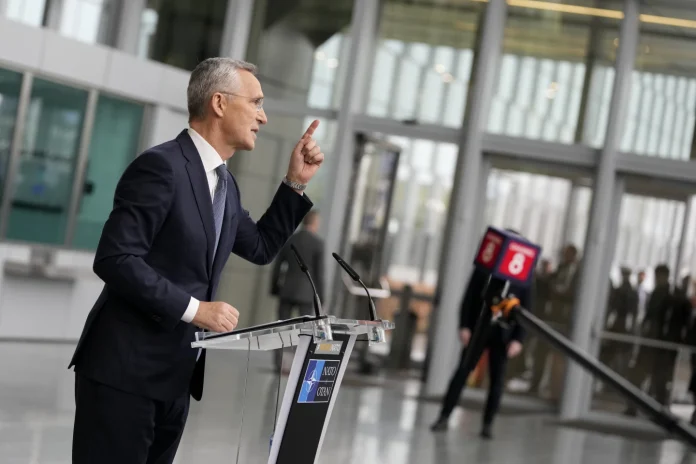NATO Secretary General Jens Stoltenberg stated on Wednesday that alliance members should guarantee long-term arms supplies to Ukraine, as ministers discussed a proposal for a five-year fund of 100 billion euros, according to the official NATO website.
“Support from NATO Allies and support from the United States to Ukraine is something which benefits our own security interests. It is therefore in the security interests of the United States to make a decision and provide Ukraine with ammunition.”
Stoltenberg proposed establishing a 100-billion-euro ($108 billion) fund to help equip Ukraine in its fight against Russia.
“Because by allocating a fraction of our defence budgets we have enabled the Ukrainians to destroy significant parts of the Russian combat capability without putting any NATO soldier, any US soldier, in harm’s way. So this is really something that is in our interest to continue to do.”
Foreign ministers were due to hold preliminary talks on a five-year plan during a two-day meeting as NATO sought to forge a package of support for Ukraine by the July summit in Washington. Diplomats warned many questions remained about the source of the funding and the proposal itself could change dramatically by the summit.
The plan by Stoltenberg also suggests that NATO would assume greater control over the coordination of arms deliveries to Kyiv from a US-led grouping that currently helps monitor the support.
Ukraine has urgent needs. Any delay in providing support has consequences on the battlefield as we speak. So we need to shift the dynamics of our support.
Officials argue that the involvement of the US grouping could guarantee an influx of weapons to Ukraine despite Donald Trump’s potential return to the White House in November. NATO’s decision to allocate money to help Ukraine would mark a major step for the alliance, which has so far refused as an organisation to send weapons to Kyiv amid concerns it would drag NATO into war.
Latvian foreign minister Krišjānis Kariņš called the 100 billion-euro fund “a very good proposal.”
“This is the direction that we need to think of, how we can pool our common resources to be more effective in aiding Ukraine.”
However, there were those who did not support NATO’s aspirations. Hungary stated that it would not back any proposal that could “draw the alliance closer to war.”
Stoltenberg’s offer came as Ukraine’s military was struggling to hold back Russia amid concerns that Kyiv’s Western allies would reduce supplies. The allies are also concerned that a $60-billion US funding package will remain frozen in Congress.
